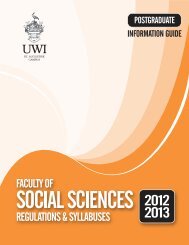Faculty of Humanities and Education (Postgraduate) - The University ...
Faculty of Humanities and Education (Postgraduate) - The University ...
Faculty of Humanities and Education (Postgraduate) - The University ...
Create successful ePaper yourself
Turn your PDF publications into a flip-book with our unique Google optimized e-Paper software.
POSTGRADUATE REGULATIONS & SYLLABUSES 2012 - 2013<br />
THE FACULTY OF HUMANITIES & EDUCATION<br />
SEMESTER:<br />
COURSE CODE: EDTL 5230<br />
COURSE TITLE: THE PRACTICE OF EDUCATION<br />
NUMBER OF CREDITS: 10<br />
COURSE DESCRIPTION: This course will focus on school<br />
practice under the guidance <strong>and</strong> supervision <strong>of</strong> curriculum<br />
tutors who will visit on Mondays to Thursdays throughout<br />
the year. During this time, curriculum tutors will advise <strong>and</strong><br />
provide opportunities for guided experimentation with various<br />
methods. <strong>The</strong> period <strong>of</strong> School Practice runs from October to<br />
the end <strong>of</strong> May. Students will be required to keep a record book<br />
for the purpose <strong>of</strong> recording lesson plans, teaching notes, etc.<br />
This record book will form part <strong>of</strong> a Curriculum Portfolio, which<br />
will also include teacher reflections, media products, assessment<br />
assignments, <strong>and</strong> elective projects. <strong>The</strong> Portfolio is an essential<br />
component <strong>of</strong> the Practice <strong>of</strong> <strong>Education</strong>. Curriculum Tutors will<br />
provide further guidelines for developing these portfolios. <strong>The</strong><br />
evaluation <strong>of</strong> student performance will be done throughout the<br />
year with a final assessment made in the third term. Two tutors<br />
will then observe <strong>and</strong> assess the student’s skill in teaching, <strong>and</strong><br />
will examine lesson notes <strong>and</strong> plans, course outlines, units <strong>of</strong><br />
work, <strong>and</strong> other relevant items. This assessment will take into<br />
account progress shown over the year.<br />
Syllabus<br />
<strong>The</strong> following are some <strong>of</strong> the attitudes <strong>and</strong> skills which teachers<br />
will be encouraged to develop.<br />
A. Attitudes/Interpersonal Skills<br />
• Respect for <strong>and</strong> acceptance <strong>of</strong> each learner as a unique<br />
individual<br />
• Ability to relate to each learner on a person-to-person<br />
basis when needed<br />
• Ability to interact with students without inducing<br />
defensive behaviour<br />
• Ability to criticize students with least possible harm to<br />
their status <strong>and</strong> self-concept<br />
• A healthy attitude to school work <strong>and</strong> to colleagues<br />
B. Lesson Presentation Skills<br />
1. Stage I - Pre-Operational<br />
Diagnostic Competence - Awareness <strong>of</strong> the Nature<br />
<strong>and</strong> Needs <strong>of</strong> Students<br />
• Ability to analyze <strong>and</strong> use students’ past<br />
experiences<br />
• Ability to determine students’ level <strong>of</strong><br />
attainment<br />
• Ability to identify students’unique learning styles<br />
<strong>and</strong> problems<br />
• Ability to state objectives in accordance with<br />
knowledge about nature <strong>and</strong> needs <strong>of</strong> students<br />
Planning Competence<br />
• Acquaintance <strong>of</strong> teacher with fundamental ideas<br />
<strong>of</strong> his subject discipline<br />
• Ability to select <strong>and</strong> organize content for<br />
sequential <strong>and</strong> cumulative learning, i.e., to allow<br />
each successive learning experience to build on<br />
the preceding one<br />
• Ability to choose/create appropriate materials<br />
<strong>and</strong> opportunities for learning<br />
2. Stage II - Operational<br />
Teaching Competence<br />
C. Motivation Skills<br />
(Arousing, maintaining students’ interest in pursuing<br />
learning goals)<br />
Ability to:<br />
• prepare students for classroom activities or establish a<br />
predisposition to learn<br />
• holdstudents’attentionbyvaryingteachingbehaviour<br />
<strong>and</strong> learning activities<br />
• recognize <strong>and</strong> manage non-attending behaviour<br />
• make lessons relevant to students’ intellectual<br />
emotional, social, <strong>and</strong> other concerns<br />
• exercise effective class management strategies<br />
D. Questioning Skills<br />
Ability to:<br />
• ask probing questions which elicit more than<br />
superficial responses<br />
• ask higher-order questions which require evaluative<br />
responses or application <strong>of</strong> concepts or principles<br />
• encourage student-initiated questions<br />
E. Communicative Skills<br />
• Evidence <strong>of</strong> good comm<strong>and</strong> <strong>of</strong> language (word usage,<br />
enunciation, pronunciation, voice pitch, etc.)<br />
• Ability to adapt language to verbal level <strong>of</strong> students<br />
• Ability to organize material for effective presentation<br />
<strong>and</strong> reception (main points, supporting material,<br />
illustrations, summary)<br />
F. Grouping Skills<br />
• Evidence <strong>and</strong> knowledge <strong>of</strong> group dynamics <strong>and</strong><br />
group processes<br />
• Ability to employ large- <strong>and</strong> small-group procedures<br />
• Ability to apply guidelines for effective group<br />
discussion<br />
G. Skills in Facilitating Problem-Solving (Inquiry, Discovery<br />
Skills)<br />
Ability to help students:<br />
• identify a problem<br />
• formulate questions about the problem<br />
• hypothesize possible solutions<br />
• plan problem-solving strategies <strong>and</strong> identify data<br />
sources<br />
• report findings<br />
• establish generalizations<br />
77

















